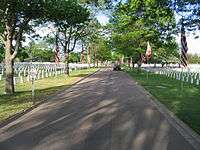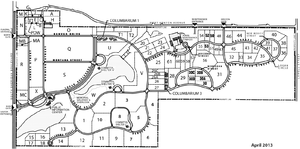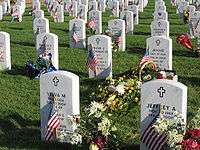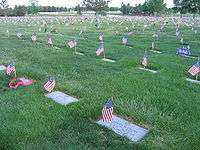Fort Logan National Cemetery
|
Fort Logan National Cemetery | |
| Details | |
|---|---|
| Established | 1887 |
| Location | Denver, Colorado |
| Country | United States |
| Coordinates | 39°38′50″N 105°02′42″W / 39.64722°N 105.04500°WCoordinates: 39°38′50″N 105°02′42″W / 39.64722°N 105.04500°W |
| Type | United States National Cemetery |
| Size | 214 acres (87 ha) |
| Number of graves | 122,000 |
| Website | Official |
| Find a Grave | Fort Logan National Cemetery |
Fort Logan National Cemetery is a National Military Cemetery in Denver, Colorado. Fort Logan was named after Union General John A. Logan, commander of US Volunteer forces during the American Civil War. It contains 214 acres (87 ha) and has over 122,000 interments as of 2014.

A street in Fort Logan National Cemetery during Memorial Day weekend
History
Fort Logan itself was established on October 31, 1887, and was in continuous use until 1960 when most of the acreage except for the cemetery was turned over to the state of Colorado. The national cemetery was created in 1950.
Notable burials
- Medal of Honor recipients
- Major William E. Adams (1939–1971) – U.S. Army, A/227th Assault Helicopter Co., 52nd Aviation Battalion, 1st Aviation Brigade. Kontum Province, Republic of Vietnam, May 25, 1971.[1]
- First Sergeant Maximo Yabes (1932–1967) – U.S. Army, Company A, 4th Battalion, 9th Infantry, 25th Infantry Division. Phu Hoa Dong, Republic of Vietnam, February 26, 1967[1]
- Private John Davis (1838–1901) – Company F, 17th Indiana Mounted Infantry. Culloden, Georgia, April 1865 (Civil War) (cenotaph)[1]
- Others
- George R. Caron (1919–1995) – tail gunner on the Enola Gay
- John A. Carroll (1901–1995) – United States Representative and Senator
- John F. Curry (1886–1973) – Major General and first commander of the Civil Air Patrol
- Byron "Mex" Johnson (1911–2005) – Negro League baseball player
- Ernest Klingbeil (1908–1995) – professional hockey player
- Arthur Harvey (1895–1976) – oil pioneer and a veteran of World War I and World War II
- Richard H. Kindig (1916–2008) – photographer noted for documenting the rail transport industry of Colorado and the Rocky Mountains[2][3]
- Fitzroy Newsum (1918–2013) – original member of the Tuskegee Airmen[4]
- Karl H. Timmermann (1922–1951) – Commanded the unit which captured the Rhine River's Ludendorff Bridge at Remagen during World War II
- Steven Curnow, Kyle Velasquez- Victims of the Columbine High School Massacre
Gallery

Fort Logan National Cemetery Map
 Bond Brye
Bond Brye Graves in a newer section
Graves in a newer section- Fort Logan National Cemetery, April 5, 2012
 Flags placed on graves, Memorial Day 2006
Flags placed on graves, Memorial Day 2006 Graves in the older section
Graves in the older section Grave of Karl F. Baatz, a German World War II POW
Grave of Karl F. Baatz, a German World War II POW
References
- 1 2 3 Dept. of Veterans Affairs: Cemeteries – Fort Logan National Cemetery
- ↑ Hees, Randy (2008-04-07). "Richard Kindig". Railway Preservation News. Retrieved 2008-04-11.
- ↑ "Richard Kindig Passes Away". DRGW.net. 2008-04-07. Retrieved 2008-04-11.
- ↑ Davidson, Joanne (2013-01-13). "Tuskegee Airman Fitzroy "Buck" Newsum, 94, persevered to be a pilot". Denver Post. Retrieved 2013-01-16.
- ↑ http://www.cem.va.gov/cem/faxpmc.asp
External links
| Wikimedia Commons has media related to Fort Logan National Cemetery. |
- Fort Logan National Cemetery website
- Gravesite Locator (for all national cemetaries)
- Friends of Historic Fort Logan
- Historic American Landscapes Survey (HALS) No. CO-2, "Fort Logan National Cemetery, 3698 South Sheridan Boulevard, Denver, Denver, CO"
- U.S. Geological Survey Geographic Names Information System: Fort Logan National Cemetery
This article is issued from Wikipedia - version of the 10/9/2016. The text is available under the Creative Commons Attribution/Share Alike but additional terms may apply for the media files.
